If you didn’t already know, anything past the first page of Google is known as the graveyard. It’s where hardworking businesses trying to get consumers’ attention go to rot and die. But that doesn’t have to be your business.
As we venture further into 2023, the role of SEO in catapulting your local home service business to the top of Google’s search ranking cannot be overstated. With contentless businesses vying for potential customers’ attention during the busy summer season, it’s essential you understand SEO and how to implement it so that you can give your home service business the cutting edge it needs to get ahead.
What is Search Engine Optimization?
SEO, short for Search Engine Optimization, is a digital marketing strategy that involves enhancing your website to boost its visibility and position on search engine results pages (SERPs), like Google. For home service businesses, it’s all about making your website stand out when potential customers search for the services you off.
When you use SEO strategies like researching relevant keywords, optimizing both on-page and off-page elements, and creating value backlinks, you significantly improve the likelihood of achieving a higher position in search results. This increased visibility leads to more people discovering your website, driving greater traffic and potential customer engagement to your business.
SEO is a powerful tool that helps home service businesses connect with their target audience and grow their online presence.
Why Does Your Google Ranking Matter?
As we mentioned above, anything beyond the initial page of Google search results tends to be overlooked. Online data indicates that the first page’s top five organic results account for over 67% of total clicks [iMPACT].
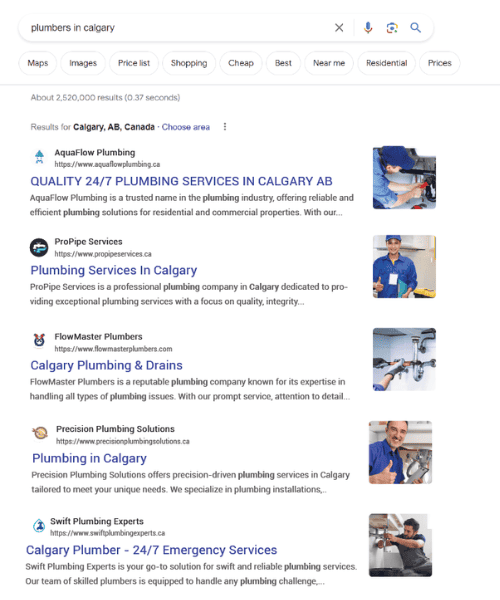
In the grand scheme of things, attracting more visitors to your website opens up greater opportunities for converting them into new customers for your home service business. Additionally, surpassing your competitors in search rankings allows you to capture some of their potential customer bases.
But the benefits go beyond gaining new customers or redirecting potential customers from competitors. Enhancing your brand or business credibility plays a vital role. While credibility may not sound as exciting as gaining new customers, establishing yourself as a reputable business within your home service niche has a direct impact on transforming leads into paying customers
SEO Best Practices for Home Service Businesses
Trends change and evolve over time—similarly, Google is constantly evaluating which factors indicate a high-quality website for its users. That’s why it’s important to keep up with these ranking factors if you want to stay on top of search engine results pages (SERPs). So, let’s break down how your home service business can rank higher on Google in 2023.
1. Craft Content that Matches User Search Intent
The truth is Google favours websites that provide content that matches what people are searching for most frequently. So, have you considered what your target audience typically types into the search bar?
If people can generally get what they’re looking for from your website, you can expect your rankings to improve. If not, Google will drop your site down a few spots.
The key in this step is to make sure your page gives users EXACTLY what they’re looking for.
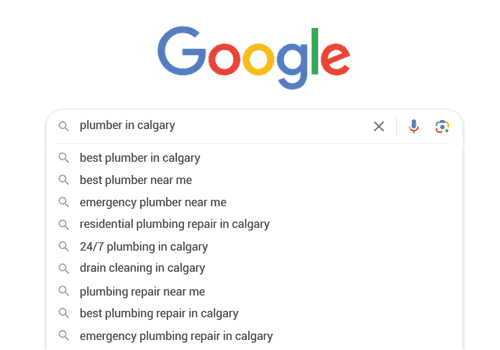
In order to improve your search ranking with search intent, it’s important to grapes the underlying reasons why people would search for a specific keyword. What are their objectives? Once you have a clear understanding of this, it becomes easier to determine the type fo content you should create with their needs and offer solutions to their problems, you can optimize your chances of ranking higher and providing valuable results.
2. Create Engaging Content
Speaking of content, it’s important to know that Google now emphasizes the importance of producing fresh, educational, and captivating content on your website.
While website optimization plays a significant role in on-page SEO in 2023, it’s essential to understand that without creating high-quality content, Google will not prioritize ranking your site higher in search engine results.
Nowadays, Google places significant emphasis on the uniqueness of your website’s copy. Regardless of the SEO techniques employed, the text must possess distinct qualities that not only enhance rankings but also captivate readers, leaving them desiring more information from your content.
One ranking factor to avoid is cannibalizing your own original content. This means avoiding repetitive use of the same topics and keywords in blogs, newsletters, and other forms of content on different pages. By doing so, you not only improve your organic search engine traffic but also enhance customer engagement.
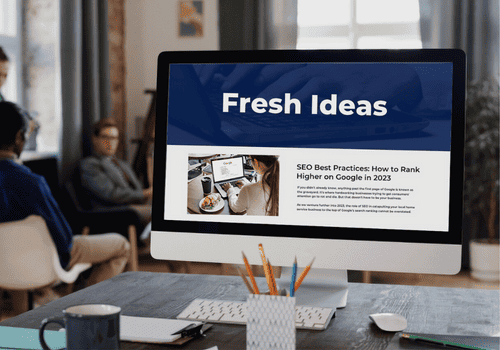
To rank higher on Google, focus on creating posts that address readers’ questions and provide unique value compared to other web pages. If your content is similar or identical to what is already ranking for a specific keyword query, it can negatively impact your site’s ranking in search engine results.
Google values trustworthy, fresh, and high-quality content. Anything less than top-notch quality may result in consequences such as a reduced crawl rate by Googlebot, which is responsible for exploring trending online content.
The length of your content also plays a role in boosting rankings. If you wonder why certain posts appear before others in search engine results, it’s likely one of the reasons. More words contribute to better rankings and higher-quality content for readers.
3. Optimize Meta Titles and Descriptions
Meta tags are snippets of HTML code that provide information about a webpage’s content to search engines and website browsers. They are not visible on the webpage itself but are embedded in the page’s source code and show up in SERPs to make it easier for users to understand what your website is about before even clicking through.
There are several types of meta tags, but two commonly used ones are:
- Meta Titles: This appears as the clickable headline in search engine results and is crucial for conveying the webpage’s topic and attracting user attention. A well-crafted meta title can help improve search engine visibility and click-through rates. These should be 50 to 60 characters (including spaces) in length.
- Meta Description: This provides a concise summary of your website’s content. It appears below the meta title in search engine results and aims to entice users to click on the link and visit your website. While meta descriptions do not directly impact search engine rankings, they play a significant role in attracting organic traffic. These should be 150 to 160 characters in length.
Here are some other best practices for title tags to keep in mind:
- Match search intent
- Avoid duplicate title tags
- Include your target keyword
- Avoid keyword stuffing
- Keep them descriptive but concise
4. Optimize and Compress Images
Images hold immense potential in enhancing user experience for website visitors. When utilized effectively, images can also contribute to your SEO. The best way to do that is by optimizing and compressing your images for optimal performance.
1. Choose the Ideal File Format
Selecting the appropriate file format is crucial as images often constitute a significant portion of a webpage’s size and loading time. Prioritizing page speed is essential for ensuring a seamless user experience. The two most commonly used formats are JPEG and PNG, each utilizing distinct compression techniques. Consider the following factors when choosing between them:
- JPEG: Best suited for photographs and complex images, as it provides efficient compression with minimal loss of quality.
- PNG: Ideal for images containing text, line drawings, or graphics with transparency. It offers lossless compression, preserving image integrity.
- WebP: A modern image format recommended by Google. WebP provides superior lossless and lossy compression, resulting in smaller file sizes compared to both PNG and JPEG formats. According to Google, WebP lossless images are 26% smaller than PNGs and 34% smaller than comparable JPEGs.
2. Compress Your Images
Image compression involves reducing file sizes without significantly compromising image quality. Since larger image file sizes lead to longer page loading times, compressing images is crucial for optimal website performance. Here are some tools that can assist you in this process:
- TinyPNG: This tool utilizes smart lossy compression techniques to minimize the file size of both PNG and JPEG images.
- ImageOptim: Considered the premier tool for image compression on Mac, ImageOptim efficiently reduces image sizes while maintaining quality.
- ShortPixel: A noteworthy WordPress plugin that automates image compression, ensuring your images are optimized without manual intervention.
.
Pro-tip: Use alt-text (alternative text) to describe the images on your website to help search engine crawlers gain context for your images, and help those who need a screen reader to read websites.
5. Use Internal Links
Utilizing internal links within your website plays a significant role in enhancing your search engine rankings. These links aid search engines in understanding the structure and organization of your site, as well as how you facilitate visitors’ navigation to find information.
By implementing internal linking strategies, you not only boost your search rankings but also have the opportunity to redirect traffic from well-performing pages to those that may have been overlooked. However, it is crucial to be cautious and avoid any linking errors, as they can severely impact your SEO efforts and outcomes.
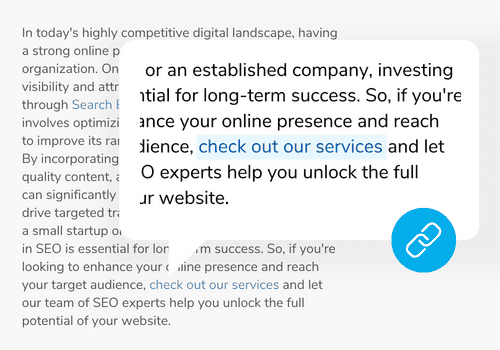
6. Create Quality Backlinks
Obtaining backlinks from reputable websites holds immense importance in terms of SEO. These backlinks contribute to establishing your authority within your specific industry and enhancing your search engine rankings for targeted keywords. However, it is crucial to be mindful of certain factors:
- Avoid acquiring links through spamming techniques.
- Steer clear of sponsored links that may compromise the integrity of your backlink profile.
- Ensure that the backlinks you acquire are from websites that are topically relevant to your niche.
- Avoid backlinks from sites that are not indexed by search engines.
- Make sure that the anchor text used for the backlinks is not the same as the keyword targeted by the page.
In essence, it is crucial to avoid toxic links as they can have a detrimental impact on your SEO efforts. It is important to prioritize the quality of your backlinks to achieve improved search engine rankings.
7. Prioritize Your Website Loading Speed
In 2023, Google introduced a new metric called “Core Web Vitals” to evaluate the quality of websites, aiming to ensure an optimal user experience. According to their guidelines, one of the primary factors measured is the speed at which pages load, including the responsiveness of fonts and images.
Paying attention to these metrics is crucial because if visitors to your website do not perceive a fast and satisfactory experience right from the start, they may not have the patience to explore beyond the initial page. This can significantly impact user experience and engagement.
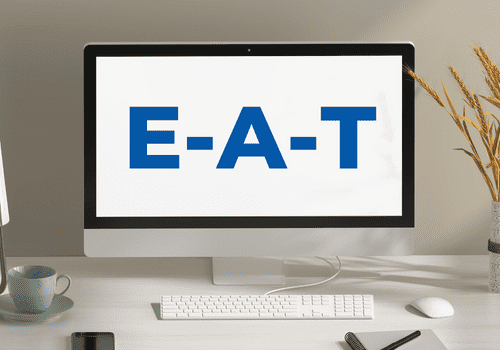
8. E-A-T
E-A-T, which stands for Expertise, Authoritativeness, and Trustworthiness, is a crucial concept in evaluating webpage quality. Google employs a tool called Search Quality Rater to assess the authority and quality of webpages, with a specific focus on E-A-T. The expertise and authority demonstrated in your content play a significant role in determining your ranking in search results.
Additionally, Google places importance on verifying the accuracy and reliability of information. It is essential to provide up-to-date information on your website, as your audience is constantly seeking new and relevant information. As a content creator, it is vital to stay updated and ensure the accuracy of the information you provide on your website.
How Are Your Website’s SEO Efforts?
Are you struggling to get new customers with your marketing? Try out Harvard Excelerate’s FREE digital marketing health check for your business now. This analysis will help you understand where you need to focus your marketing efforts so your home service business can reach a wider audience in your local area.
Harvard Excelerate has a team of local marketing experts with over 40 years of experience in media and advertising. We have worked with home service businesses in the following industries:
Contact Harvard Excelerate today to boost your rankings with Google, establish authority in your niche, and accomplish your website traffic and conversion objectives.



